Full coverage and analysis of the crash, it's aftermath and what happens next.
 ADVERTISEMENT
ADVERTISEMENT
 ADVERTISEMENT
ADVERTISEMENT

 ${title}
${title}
Live ended
What we know so far
- Wagner leader Yevgeny Prigozhin has been killed in a plane crash north of Moscow
- 10 bodies have been recovered from the crash site, including seven passengers and three crew
- One of those killed is believed to be Dmitry Utkin, Wagner's co-founder
- Speculation is rife over the incident. Russian state media say the aircraft caught fire upon hitting the ground. But the Wagner-linked Telegram channel Grey Zone claims it was shot down by the Russian military
- An investigation has begun into the cause of the crash
- Neither the Kremlin nor the Russian Ministry of Defence have commented on Prigozhin's apparent death
- Prigozhin led an abortive armed rebellion inside Russia earlier this year, marching on Moscow. Russian President Vladimir Putin denounced it "treason" at the time
That's the end of our live coverage of the crash of an aircraft carrying the boss of Wagner mercenary group Yevgeny Prigozhin.
You can find more coverage and analysis of the reactions, aftermath and what comes next at our website www.euronews.com
Putin: Prigozhin was a 'talented man' with a 'difficult destiny'
Russian President Vladimir Putin has expressed his condolences to the families of the ten people who were aboard a jet, including Wagner mercenary chief Yevgeny Prigozhin, which crashed near Moscow on Wednesday evening.
Speaking at the Kremlin, Putin expressed his condolences to the families of the ten people aboard the jet, including mercenary head Yevgeny Prigozhin, who he described as a "talented man" with a "difficult destiny."
Putin made the remarks on Thursday while speaking with the Russian-installed leader of Ukraine’s partially-occupied Donetsk region, Denis Pushilin, in a televised interview.
Putin also pledged to investigate the causes of the crash, which took place shortly after the plane took off from a Moscow airport, en route to St. Petersburg.
(AP)
Wagner's leader was the inevitable product of Putin's Russia
Yevgeny Prigozhin, with his frightening grimace, was the type of character who lived for bloody and chaotic times, wrote Aleksandar Đokić for Euronews View in May.
Đokić explored the way Russia's elites are made and how they tend to operate, looking at the shadowy origins of Wagner as a tool of plausible deniability for the Russian state, its leader's rise up the hierarchy and how Putin handles internal struggles.
In the "shark tank" of modern Russia, he argues, "brazen criminal types like Prigozhin are the ones that thrive, as these are their natural surroundings."
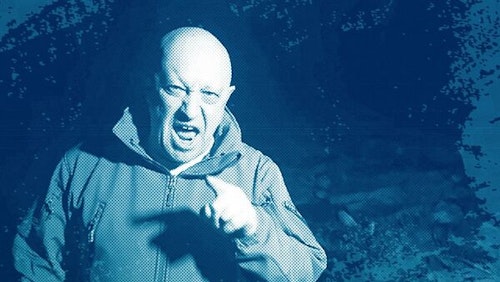
French FM jokes about death rate of Putin's inner circle
French Foreign Minister Catherine Colonna reacted with irony on Thursday to the alleged death of Wagner boss Yevgeny Prigozhin, saying "the death rate among those close to Putin is particularly high."
"It's a risky business," she told the AFP news agency, declining to comment further.
(AFP)
Prigozhin's death 'doesn't change much' for region - Lithuania
The presumed death of Wagner's leader, Yevgeny Prigozhin, will have little impact on regional security, the Lithuanian president said on Thursday, stressing that its mercenaries were still present in neighbouring Belarus.
"We really shouldn't think that Prigozhin's death should make us any calmer or that it somehow improves the security situation," said Gitanas Nauseda.
"[It] does not change much," he added.
Lithuania, a small Baltic country on NATO's eastern flank, has warned of the risks posed by Wagner after its mercenaries reportedly relocated to Belarus in June.
Fears of a Russian provocation on Lithuania and Poland's borders have since grown, with the two NATO members beefing up security on the frontier with Belarus.
Echoing the Lithuanian president, Polish Prime Minister Mateusz Morawiecki said Wagner was now "under the direct supervision of Putin and his people", following Wednesday's incident.
"Even more than before, or at least like today, it will be used as a tool of provocation, of blackmail... to destabilise the countries bordering Russia and Belarus", he added on Thursday.
(AFP)
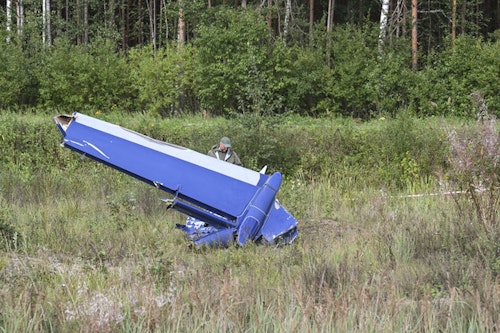
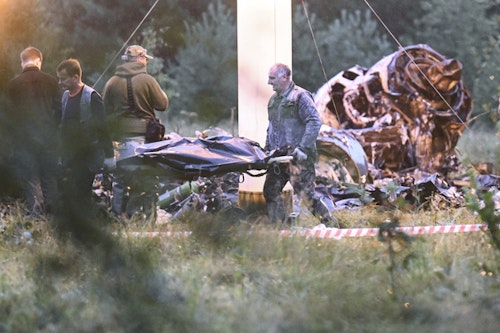
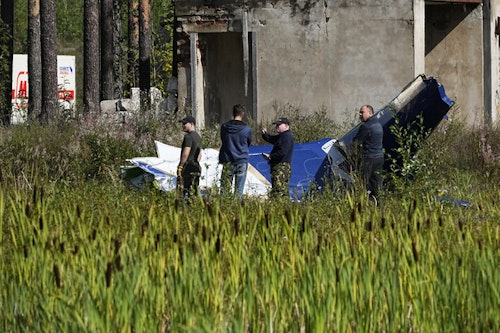
Plane crash should not come as a shock - analyst
The apparent death of the Wagner boss in Wednesday's plane crash marks just another turn in Putin's effort to shore himself up, an analyst has said, warning it won't change the disastrous trajectory of the Ukraine war.
"The Russians have a lot of form here," James Nixey, director of the Russia and Eurasia Programme at UK think tank Chatham House, wrote in a statement sent to Euronews. "Throughout Soviet and post-Soviet history there have been suspicious air crashes when rivals were a threat or became too popular.
He cites the examples of Yuri Gagarin in 1968 and General Alexander Lebed (a one-time possible contender for the presidency) in 2002, who both died in mysterious circumstances in air incidents."
With the steady flow of assassinations (attempted and successful) and mysterious deaths that have blighted the Kremlin's opponents in recent years, the Kremlin's old reputation for ruthless political action remains justified.
"Almost everybody inside and outside of Russia accepts this is just the Russian way of doing things," Nixey added.
Ukraine claims it was not involved in plane crash
Ukrainian President Volodymyr Zelensky said on Thursday Kyiv had "nothing to do" with the alleged death of Wagner boss Yevgeny Prigozhin.
He implied the Kremlin was responsible for yesterday's plane crash, which wiped out several kay figures within the mercenary group.
"What is certain is that we have nothing to do with this situation," said Zelenskyy, during a press conference.
"I think everyone understands who is concerned."
(AFP)
Putin wanted to 'send a signal' to others - expert
Russia's president was intending to warn political elites from possible dissent, an expert told Euronews, following a plane crash that killed the Wagner leader and other figures within the mercenary group
Many Western analysts and security officials are suggesting Putin and his allies orchestrated Wednesday's plane crash, though this cannot be confirmed and a number of theories are circulating about what happened.
Russian state media say the aircraft caught fire upon hitting the ground.
"Putin sends signals to people," says Dr Stephen Hall, lecturer of Russian politics at the University of Bath. "I think this is quite a clear signal that this is what happens to traitors."
Shortly after Prigozhin's armed mutiny broke out on 24 June, the Russian president denounced the rebellion as “treason” and a “stab in the back”, vowing to avenge it.
These charges against Prigozhin were soon dropped in a secretive deal that exiled the mercenary force to Belarus. But many speculated it would not be long before the Kremlin went after the mercenary leader.
"The war is going badly and some elites are dissatisfied. By killing Prigozhin it sends the signal that if you rise up then you're going to have a very brutal end," he continues.
Nationalist and patriotic groups in Russia have become increasingly more vocal about their government's military campaign in Ukraine, often slamming them for mismanagement and botched battlefield manoeuvres.
Yet Hall said the incident could make the Kremlin "look weak".
"Some people will say it's Putin consolidating power, plausibly. But I think it's also a testament to a desperate regime... they are trying to send a signal that they will eliminate those who rose up against them... [but this] also highlights to elites conspirators are out there."
German foreign minister: 'No coincidence' that everyone suspects Kremlin of Wagner boss's death
Germany's foreign minister said Thursday that it was "no coincidence" that everyone suspected the Kremlin of being behind the alleged death of Yevgeny Prigozhin, the head of the Wagner paramililtary group whose plane crashed Wednesday evening near Moscow.
“It is no coincidence that the whole world is now looking to the Kremlin when a disgraced ex-Putin aide literally suddenly falls from the sky two months after attempting a rebellion,” Annalena Baerbock told a conference in press in Berlin, highlighting a "dictatorial" system in Russia "based on internal and external violence".
"We know this pattern in Putin's Russia, the dubious deaths and suicides, the defenestrations, all unsolved, all point to a dictatorial power system that knows only violence internally and externally," continued Mrs Baerbock during this joint conference with her counterpart from Kyrgyzstan.
(AFP)
Who are the other Wagner figures presumed dead?
Wednesday night's plane crash has reportedly claimed the lives of 10 people, including seven passengers and three crew.
The passengers are believed to include senior officers within the Wagner mercenary group.
One of them is allegedly Dmitry Uktkin, who was often described as the founder or co-founder of the mercenary group although his exact role was disputed.
Uktkin was a former officer in the GRU, Russia's foreign military intelligence agency, born in the 1970s.
Investigation unit Bellingcat wrote in 2020 that he had “an obsessive fascination with the history of the Third Reich”. Wagner - also his own call sign - was apparently named after him.
Yet, a 2020 report from the US-based Center for Strategic and International Studies, wrote “it cannot be verified whether Utkin initiated the establishment of Wagner group or was only a frontman for someone else”.
Paris raises 'doubts' about crash
A spokesman for the French government has said there were "reasonable doubts" about "the conditions" of the air crash, which is reported to have killed Prigozhin.
"We do not yet know the conditions under which this crash took place. We can have reasonable doubts", said Olivier Véran on Thursday.
He added that the Wagner chief was "the man who did Putin's dirty work. What he has done is inseparable from the policies of Putin, who gave him responsibility to carry out abuses as the head of Wagner."
"Prigozhin leaves behind him mass graves,” he said, referring to the Wagner group's human rights violations across Africa, Syria and Ukraine.
(AFP)
Putin tight-lipped about crash
Russian President Vladimir Putin did not mention the apparent death of Wagner boss Yevgeny Prigozhin, during a short video address to a BRICs summit on Thursday.
He instead thanked his South African counterpart Cyril Ramaphosa for hosting the summit.
Russian Foreign Minister Sergey Lavrov, who has been representing Putin in South Africa, did not speak at a press briefing.
Who are Russia's other mercenaries?
The apparent death of Yevgeny Prigozhin has once again put the media spotlight on Russia's Wagner mercenary group.
But there are others.
Many of Russia's rich and powerful own private military companies (PMC), with more coming out of the woodwork all the time.
They recruit an eclectic mix of ex-special forces, prisoners, extremists, vagrants, adrenaline junkies and everything in between, and operate all around the world.
Find out more about Russia's guns for hire, and what they are doing below.
Prigozhin’s death a 'lesson', says analyst
The reported death of Wagner boss Yevgeny Prigozhin will send a message to others, Tatiana Stanovaya, a senior fellow at the Carnegie Russia Eurasia Center, said on Telegram.
“From Putin’s point of view, as well as the security forces and the military — Prigozhin’s death must be a lesson to any potential followers,” she said.
“No matter what caused the plane crash, everyone will see it as an act of vengeance and retribution” by the Kremlin, and “the Kremlin wouldn’t really stand in the way of that.”
Wednesday night's plane crash, which is reported to have killed other top Wagner officers, comes after a top general linked to Prigozhin was dismissed from his position as commander of the air force.
Gen. Sergei Surovikin, who at one point led Russia's operation in Ukraine, hasn't been seen in public since Wagner's June mutiny, after he recorded a video urging Prigozhin's forces to pull back.
(AP)
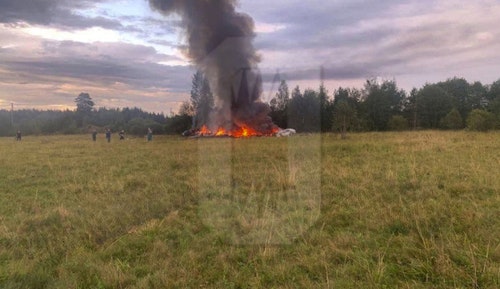
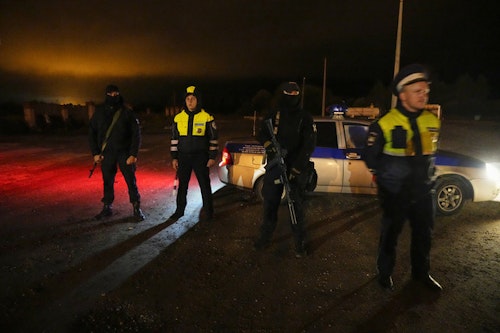
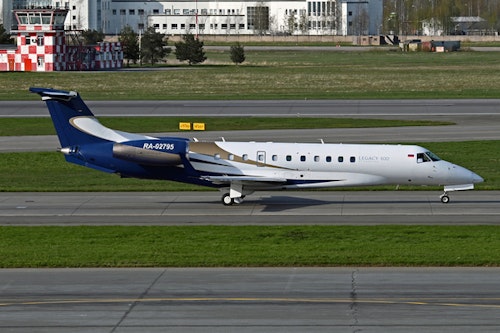
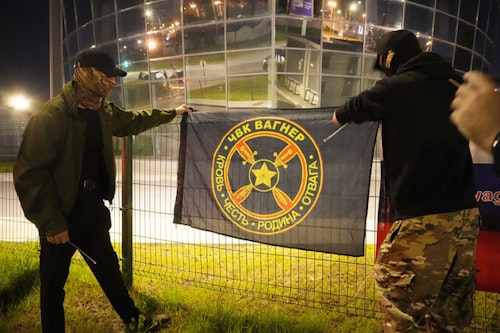
Yevgeny Prigozhin - the troublemaker
Yevgeny Prigozhin caused many a stir in Russian politics.
He hit the headlines on an almost daily basis amid the Ukraine war, pouring fire on the Russian military establishment and openly challenging Kremlin narratives about the conflict.
This earned him respect among some Russians, but he made enemies in the halls of power.
A former ally of the Russian president, Prigozhin sent his mercenary army into some of Ukraine's grittiest battles, playing an integral part in capturing the Ukrainian city of Bakhmut in a months-long bloody struggle.
Before this, he ran a troll farm meddling in US elections – landing him in hot water with the FBI – and used his private militia fighters for shady business across the African continent.
“Prigozhin is a deeply disreputable character,” Professor Mark Galeotti, an analyst of Russian politics, told Euronews in April. “This is a man who has risen by doing whatever Putin and the Kremlin want – and obviously doing very well for himself in the process.”
Prigozhin's power rested on Wagner – with no other Russian politician commanding such military force – and his massive fortune was "accrued protecting weak African regimes in exchange for their gold mines", Mark Beissinger, Professor of Politics at Princeton University, also told Euronews in April.
Buoyed by his successes in Ukraine, he picked fights with the governor of St. Petersburg and attacked the military establishment over their campaign against Kyiv.
He openly defied the Kremlin’s claim it was fighting Nazis in Ukraine, a false argument it has used repeatedly to justify the invasion. That same month the mercenary boss seemingly called on the fighting to stop.
“Prigozhin is... someone who can figure out ways to work the system, but always to some extent on the edge of that system, on the boundaries of what is acceptable, and pushing those boundaries,” Beissinger said.
“He does not identify with the oligarchic elite but is an outsider to it, as wealthy as he now is.”
Things came to a head when Prigozhin led an armed mutiny in Russia on 24 June, which saw Wagner mercenaries march on Moscow.
At the time, President Vladimir Putin denounced the rebellion as “treason” and a “stab in the back”, vowing to avenge it. These charges against Prigozhin were soon dropped in a secretive deal that exiled the mercenary force to Belarus.
Since then he has kept a low profile, though was reportedly still coming to Russia.
Analyst Galeotti told Euronews in March that Progozhin was “not appreciating that he was playing with the big boys” when lashing out at the Kremlin and Russian Ministry of Defence.
He suggested the “thuggish ex-con” may have gone too far "throwing his weight around" and "pouring vitriol" on Russia's power brokers.
“This is a man with a very strong streak of malice, I'm tempted to say that vendettas are his main hobby," Galeotti added.
Believed to hail from a working-class background, Prigozhin is thought to have spent nine years in prison for theft, as the Soviet Union unravelled during the 1980s.
He went on to found the Concord Catering company, which won billion-dollar contracts to feed Russia's schools and military and host the Kremlin's banquets.
This is widely believed to be where he first got access to Putin’s ear - and where he picked up the alleged nickname "Putin's chef.
Putin involved, suggests US president
Joe Biden has strongly hinted that Russian President Vladimir Putin was involved in the reported death of f Yevgeny Prigozhin.
“I don’t know for a fact what happened, but I’m not surprised,” the US president said. “There’s not much that happens in Russia that Putin’s not behind. But I don’t know enough to know the answer.”










